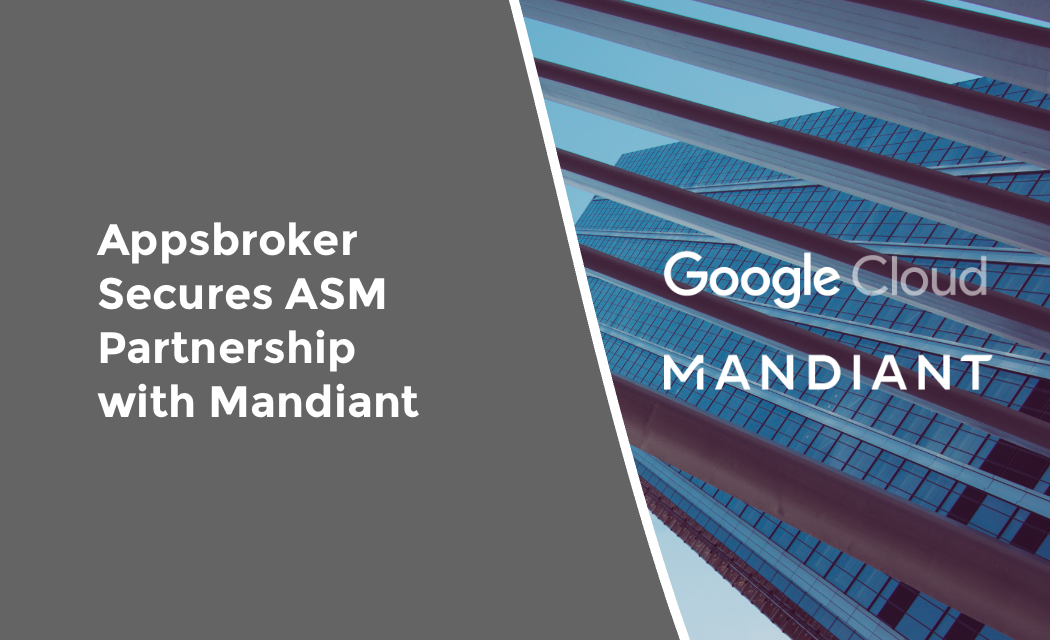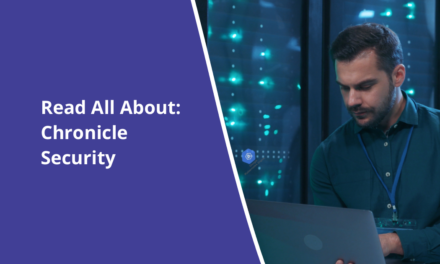Having already delivered world-class security solutions for leading large-enterprise organisations across Europe, Appsbroker (an Appsbroker CTS company) has been selected as the only UK partner authorised to deliver managed services around Mandiant’s Attack Surface Management, a leading threat intelligence solution, and now part of Google Cloud.
This forms part of Appsbroker’s Cloud Guardian managed security solutions, which means we can provide organisations of all sizes with access to a comprehensive set of tools, services, and expertise to identify, assess, mitigate, and respond to cyberattacks.
“We now have a terrific opportunity to coach organisations of all sizes in terms of how to achieve security at scale in a cloud native world,” said Mike Smith, Security Practice Lead and CISO at Appsbroker. “Mandiant is a leader in the field of cybersecurity, and its attack surface management solution is backed by the expertise of its team of security experts. That’s why, as Mandiant’s chosen ASM partner, we can get started with customers right away to continually identify, assess, and manage the vulnerabilities and risks associated with an organisation’s attack surface and reduce that risk.”
In this blog, you’ll learn why organisations choose ASM, and often combine it with Professional Consulting and Managed Services offerings from Appsbroker, to sure up their security armoury.
What is the Appsbroker approach to ASM?
We start by understanding the organisational risk profile and assess the current security posture to define the path to production. We complete a Cyber Hygiene programme to remediate current critical findings, future proof and better understand the organisation, and operationalise the service using a combination of Mandiant tooling, our expert consultants and the customer’s internal systems. Finally, we continue to mature the security posture through continuous integration, threat definition and collaboration.
In truth, our proven four-step methodology means customers see value immediately, and by taking time to review and plan next steps, we can tailor your service, ensure your people and processes are ready, and reduces false positives by up to 60%.
That’s because Appsbroker can deliver Managed ASM services in packaged options that come with the flexibility you need to make them work for your business, with tiered offerings that include daily scans, frequent reporting, manual investigation and enhanced notifications.
What are the common cyber defence challenges?
As Appsbroker secures an ASM partnership with Mandiant, it’s important to look at the bigger picture. “For 2023 and beyond the focus needs to be on the cyber-attack surface and vectors to determine what can be done to mitigate threats and enhance resiliency and recovery,” writes Chuck Brookes on Forbes.com, “As the interest greatly expands in users, so do the threats.”
At Appsbroker, we take the following scenarios (and more) into account by combining Google Cloud customer context and attributes with various Threat Intel sources to produce a total Threat Card score that reflects the organisational priority of a finding.
- So many devices, so little time
The increasing number of devices connected to the internet, including laptops, smartphones, tablets, and IoT devices, creates a larger attack surface for threat actors. Security teams are constantly struggling to keep up with the latest security patches and updates for all of these devices, and it can be difficult to manage and secure them all effectively.
- Business relationships share assets and risks
Organizations increasingly rely on third-party vendors and suppliers, which expands their attack surface even further. When organizations share data and assets with third parties, they also assume the risks associated with those third parties’ security posture. This can be a challenge, as organisations may not have full visibility into or control over the security practices of their third parties. Supply chain-related security risks are becoming more of a priority with threat actors often looking for the weakest link.
- More code in more places
The increasing complexity of software applications and the growing use of cloud computing are making it more difficult for security teams to identify and mitigate vulnerabilities. As code is developed and deployed more quickly, it can be difficult to ensure that all security best practices are being followed. Additionally, cloud computing can introduce new security challenges, such as multi-tenancy and shared responsibility models.
- Employees drive business operation practices
Employees are often the weakest link in the cybersecurity chain. They can be tricked into clicking on phishing emails, opening malicious attachments, or sharing sensitive information with unauthorised individuals. Additionally, employees may not always be aware of the latest security threats and best practices.
- Where do you focus your limited resources?
Given the many cyber defence challenges that organisations face, it is important to prioritise and focus resources on the areas of greatest risk. This may involve conducting risk assessments to identify the organisation’s most critical assets and vulnerabilities. It is also important to have a comprehensive cybersecurity strategy in place that includes a mix of preventative, detective, and responsive measures.

What is Managed ASM?
ASM is the sum of all possible entry points that an attacker could exploit to gain access to an organisation’s systems and data. It is important because it helps organisations reduce their risk of cyber-attacks and protect their data and assets.
A Managed Security Service means outsourcing cybersecurity needs to a team of experts who will monitor systems 24/7, using a mix of person-centred and AI measures, to detect and respond to threats quickly and effectively. It’s like having a personal bodyguard for data – always there, always vigilant, and always ready to protect your business from harm.
This kind of always-on protection can minimise the damage caused by an attack and get a business back up and running quickly and securely.
What are the benefits of a Managed ASM?
Most organisations lack the time, resources and expertise to quickly introduce and upscale a security practice, let alone become an expert in cybersecurity overnight. That’s where MSS providers come in.
And Appsbroker secures an ASM partnership with Mandiant for that reason – because we can reduce the risk of a cyber attack by identifying and mitigating vulnerabilities inside an organisation’s systems and networks. They can also implement and maintain security controls to protect data and assets, and ensure an organisation is compliant with often very stringent industry regulations to avoid costly fines and penalties. The other benefit of a Managed ASM is that it can free up time to focus on more critical activities like running a business, saving time and money in the long run.
“The Appsbroker Managed Security service has enabled us to focus on our business priorities whilst their experienced security analysts and consultants keep our organisation secure as part of the shared fate operating model.”
Director of Information Security Threat Operations Global Investment Bank
Appsbroker Secures an ASM Partnership with Mandiant: What’s Next?
Whether you’re new to Google Cloud or an existing account, consider using a Managed Security services provider to help you protect your business from cyber-attacks. It is one of the best investments you can make. As Appsbroker secures an ASM Partnership with Mandiant, you can experience the benefits of market-leading Managed Security services from Appsbroker. To get started, contact our Security team and take the next step in your organisation’s journey to an improved security posture.











